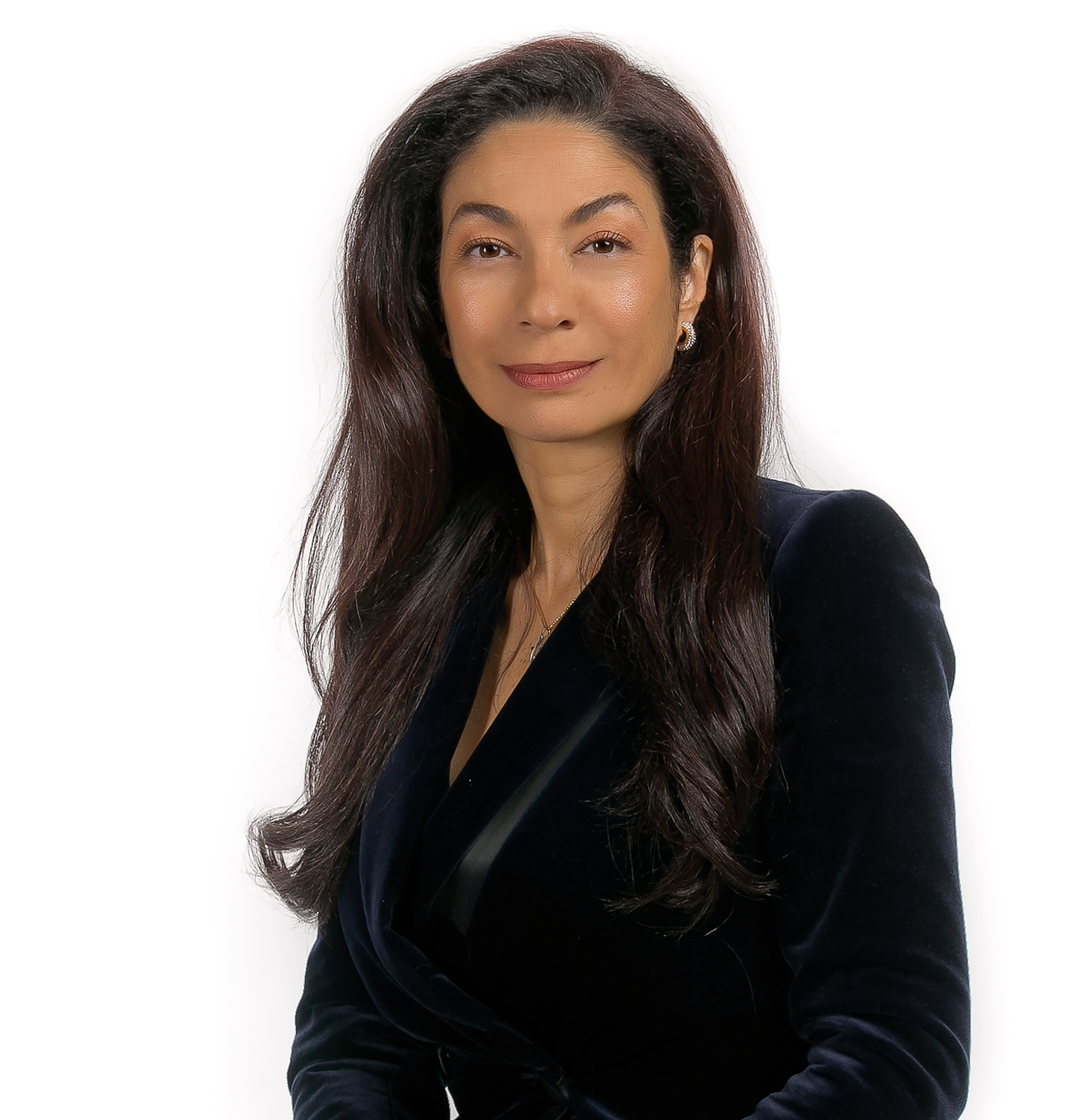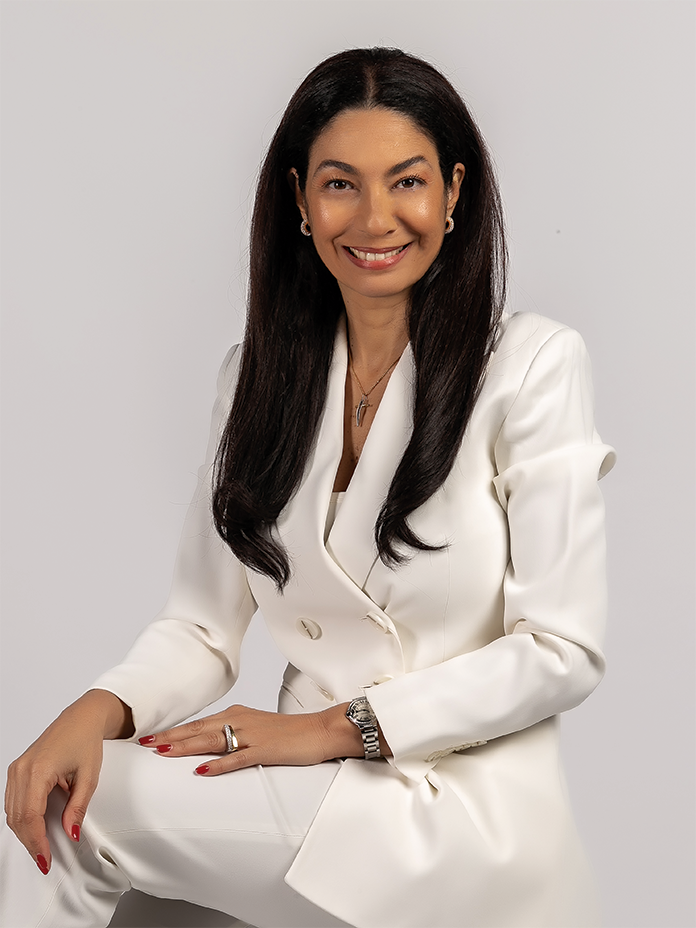
Daughter of the first black secretary of the Presidency of the Republic
of Portugal and of the Director General of Customs, Paula Osório is one of the
guests in this anniversary issue. Committed to law and order, she graduated
from the Law Faculty of the Portuguese Catholic University and is now a lawyer.
She has been building her life between Lisbon and Luanda, and is currently working
with the law firm Andrade e Mora in supporting investment in Africa. She
confesses that with this experience she has learnt that «the problems of justice do not lie in the lack of normativity,
but in the lack of application of the law or its poor use».
Who is Paula Osório?
I was born in Luanda, the daughter of a Malanje mother and a Portuguese father. I studied at the Colégio de S. José de Cluny and graduated from the Law Faculty of the Portuguese Catholic University in Lisbon. I am a mother and I live between Luanda and Lisbon.
Why Law?
As an only child, I soon swapped toys for books, just as from early on I showed a great interest in law and order, which may have been related to a high sense of justice and injustice, the result of living in the war environment of the early years of Independence and of a strict upbringing and traditional values, which my father, Portuguese General Director of the Customs, instilled in me; and of my mother, the first black secretary in the Presidency of the Republic of Portugal, with the challenges inherent to this circumstance. The confluence of these factors and challenges led me to choose law, as I believed that this way would enable me to make a contribution, however small, to the fulfilment of human rights, equality between peoples and equal opportunities.
What is your specific area of practice?
My professional career began in Portugal, in the area of Public Works, more specifically in the Infrastructures of Portugal. I worked in the private sector in Oil & Gas, at Miranda Law Firm, with an office in Luanda. Later I headed an organisation linked to the promotion of entrepreneurship and supporting the internationalisation of companies in the municipality of Oeiras, within the scope of which I promoted business missions to Angola.
In-depth knowledge of the organisational culture of Angolan bodies and mastery of the Portuguese business model allowed me to position myself in the market as a consultant for large-scale projects with high added value, making a decisive contribution to improving the business environment and to the success of the projects in which I was involved. At the moment, I’m working with the law firm Andrade e Mora in supporting investment in Africa.
Tell us of the greatest achievement of your professional career.
I’m unable to highlight one achievement. Each and every one of the stages of my professional career has enabled me to acquire and enhance skills that have contributed to my current professional maturity.
«I soon swapped toys for books»
What are the main challenges facing professionals in your sector today?
Maintaining, throughout their career, the credibility, honour and integrity that lead to trust, and not only the technical performance, but above all the permanent pursuit of the client’s best interests, ensuring loyalty, which is the unequivocal proof of the trust placed in the professional’s good performance.
And the opportunities?
The multidisciplinary nature of the projects allows skills to be developed in different areas of knowledge. In my case, accompanying clients in complex business processes, in countries with different corporate and political environments, has forced me to adjust to each reality and organisation, as well as to adapt the approach and language used. To such an extent that, this expertise, acquired over years of experience, has recently led me down a path of business mentoring, which has led me to write the Guia Prático de Protocolo e Etiqueta para Empresários e Líderes [Practical Protocol and Etiquette Guide for Entrepreneurs and Leaders], which will be presented to the public soon.
You live between Lisbon and Luanda. What legal problems persist in both countries?
In Angola, the number of courts and legal professionals – judges, lawyers, clerks, deputy clerks and bailiffs – has not kept pace with the exponential growth in the country’s population, which has grown at a constant rate of over 3% per year, from 26 million inhabitants in 2014 to 35 million people today, which has caused justice to be slow, especially in civil courts. But many steps have been taken and it is remarkable the dedication with which these professionals, especially in the province, dedicate themselves diligently to minimise the impact of the volume of cases.
In Portugal, this same issue, with regard to the slowness of justice is systemic: proceedings are slow and costly (high court fees), so that when the sentences are passed, the decision often does not arrive on time and it is more difficult to find an explanation for the lack of resolution of this deficiency in the system.
Much has been said about fighting corruption on a global scale. In Angola, ever since President João Lourenço chose, in 2017, the fight against corruption as the goal of his presidency, all eyes have been on the progress of media-covered court cases. Various international bodies have recognised the merit of the Angolan courts and their contribution to the transparency of legal proceedings against corruption. Portugal has been in the opposite direction. In 2020, the European Commission considered that the fight against corruption in Portuguese courts was deficient and identified several shortcomings in the scrutiny of the system of distribution of judicial cases in the courts.
Are there similarities between the legal systems of Portugal and Angola?
The legal systems, although they have many similarities, are dissimilar. I believe that the question is more related to whether or not it is worthwhile to file lawsuits in Angolan courts and if their decisions are respected and executed, just as in Europe, or more specifically, in Portugal. And if so, my answer is yes.
«In Angola, the number of courts and legal professionals (...) has not kept pace with the exponential growth in the population»
Have you ever felt victim of gender inequality when working?
Yes. I have experienced positive discrimination, that is to say, benefitting from being a woman. For example, I noticed that it was easier for me to get a meeting or to be heard than it was for my male colleagues. But negative discrimination has been by far the most frequent, whereby I have noted different and prejudiced treatment due to the fact that I am a woman. In both cases it happened mainly in the early years of my career. Being a woman, young and beautiful was synonymous with less ability or even less intelligence. I have always enjoyed working with women and I have hired several with whom I have had the privilege of creating an enthusiastic work environment, in a mostly male universe. I believe that society as a whole has evolved a great deal. Today, female leadership is a reality that does not seem strange or cause discomfort.
What is the greatest lesson that your career has taught you?
I have learnt that the problems of justice do not have to do with lack of normativity, but rather with the lack of application of the law or its poor use. My career has mainly allowed me to accomplish myself as a professional, although the most important thing in my life is family and love.
We are celebrating the 13th anniversary of Villas&Golfe magazine, in Angola. What have these last few years represented for you in your life and in the country?
Thirteen years ago, I was just starting a master’s degree and making my mark in the working world, while at the same time charting new paths as an independent woman. Just like the phoenix, being reborn for a new phase of my life, which allowed me to become the woman I am today. While I was rediscovering myself, the world was discovering post-war Angola. It was the beginning of a phase of enormous excitement and changes that would place Angola at the political and geostrategic epicentre of Africa.
Who is Paula Osório?
I was born in Luanda, the daughter of a Malanje mother and a Portuguese father. I studied at the Colégio de S. José de Cluny and graduated from the Law Faculty of the Portuguese Catholic University in Lisbon. I am a mother and I live between Luanda and Lisbon.
Why Law?
As an only child, I soon swapped toys for books, just as from early on I showed a great interest in law and order, which may have been related to a high sense of justice and injustice, the result of living in the war environment of the early years of Independence and of a strict upbringing and traditional values, which my father, Portuguese General Director of the Customs, instilled in me; and of my mother, the first black secretary in the Presidency of the Republic of Portugal, with the challenges inherent to this circumstance. The confluence of these factors and challenges led me to choose law, as I believed that this way would enable me to make a contribution, however small, to the fulfilment of human rights, equality between peoples and equal opportunities.
What is your specific area of practice?
My professional career began in Portugal, in the area of Public Works, more specifically in the Infrastructures of Portugal. I worked in the private sector in Oil & Gas, at Miranda Law Firm, with an office in Luanda. Later I headed an organisation linked to the promotion of entrepreneurship and supporting the internationalisation of companies in the municipality of Oeiras, within the scope of which I promoted business missions to Angola.
In-depth knowledge of the organisational culture of Angolan bodies and mastery of the Portuguese business model allowed me to position myself in the market as a consultant for large-scale projects with high added value, making a decisive contribution to improving the business environment and to the success of the projects in which I was involved. At the moment, I’m working with the law firm Andrade e Mora in supporting investment in Africa.
Tell us of the greatest achievement of your professional career.
I’m unable to highlight one achievement. Each and every one of the stages of my professional career has enabled me to acquire and enhance skills that have contributed to my current professional maturity.
«I soon swapped toys for books»
What are the main challenges facing professionals in your sector today?
Maintaining, throughout their career, the credibility, honour and integrity that lead to trust, and not only the technical performance, but above all the permanent pursuit of the client’s best interests, ensuring loyalty, which is the unequivocal proof of the trust placed in the professional’s good performance.
And the opportunities?
The multidisciplinary nature of the projects allows skills to be developed in different areas of knowledge. In my case, accompanying clients in complex business processes, in countries with different corporate and political environments, has forced me to adjust to each reality and organisation, as well as to adapt the approach and language used. To such an extent that, this expertise, acquired over years of experience, has recently led me down a path of business mentoring, which has led me to write the Guia Prático de Protocolo e Etiqueta para Empresários e Líderes [Practical Protocol and Etiquette Guide for Entrepreneurs and Leaders], which will be presented to the public soon.
You live between Lisbon and Luanda. What legal problems persist in both countries?
In Angola, the number of courts and legal professionals – judges, lawyers, clerks, deputy clerks and bailiffs – has not kept pace with the exponential growth in the country’s population, which has grown at a constant rate of over 3% per year, from 26 million inhabitants in 2014 to 35 million people today, which has caused justice to be slow, especially in civil courts. But many steps have been taken and it is remarkable the dedication with which these professionals, especially in the province, dedicate themselves diligently to minimise the impact of the volume of cases.
In Portugal, this same issue, with regard to the slowness of justice is systemic: proceedings are slow and costly (high court fees), so that when the sentences are passed, the decision often does not arrive on time and it is more difficult to find an explanation for the lack of resolution of this deficiency in the system.
Much has been said about fighting corruption on a global scale. In Angola, ever since President João Lourenço chose, in 2017, the fight against corruption as the goal of his presidency, all eyes have been on the progress of media-covered court cases. Various international bodies have recognised the merit of the Angolan courts and their contribution to the transparency of legal proceedings against corruption. Portugal has been in the opposite direction. In 2020, the European Commission considered that the fight against corruption in Portuguese courts was deficient and identified several shortcomings in the scrutiny of the system of distribution of judicial cases in the courts.
Are there similarities between the legal systems of Portugal and Angola?
The legal systems, although they have many similarities, are dissimilar. I believe that the question is more related to whether or not it is worthwhile to file lawsuits in Angolan courts and if their decisions are respected and executed, just as in Europe, or more specifically, in Portugal. And if so, my answer is yes.
«In Angola, the number of courts and legal professionals (...) has not kept pace with the exponential growth in the population»
Have you ever felt victim of gender inequality when working?
Yes. I have experienced positive discrimination, that is to say, benefitting from being a woman. For example, I noticed that it was easier for me to get a meeting or to be heard than it was for my male colleagues. But negative discrimination has been by far the most frequent, whereby I have noted different and prejudiced treatment due to the fact that I am a woman. In both cases it happened mainly in the early years of my career. Being a woman, young and beautiful was synonymous with less ability or even less intelligence. I have always enjoyed working with women and I have hired several with whom I have had the privilege of creating an enthusiastic work environment, in a mostly male universe. I believe that society as a whole has evolved a great deal. Today, female leadership is a reality that does not seem strange or cause discomfort.
What is the greatest lesson that your career has taught you?
I have learnt that the problems of justice do not have to do with lack of normativity, but rather with the lack of application of the law or its poor use. My career has mainly allowed me to accomplish myself as a professional, although the most important thing in my life is family and love.
We are celebrating the 13th anniversary of Villas&Golfe magazine, in Angola. What have these last few years represented for you in your life and in the country?
Thirteen years ago, I was just starting a master’s degree and making my mark in the working world, while at the same time charting new paths as an independent woman. Just like the phoenix, being reborn for a new phase of my life, which allowed me to become the woman I am today. While I was rediscovering myself, the world was discovering post-war Angola. It was the beginning of a phase of enormous excitement and changes that would place Angola at the political and geostrategic epicentre of Africa.





